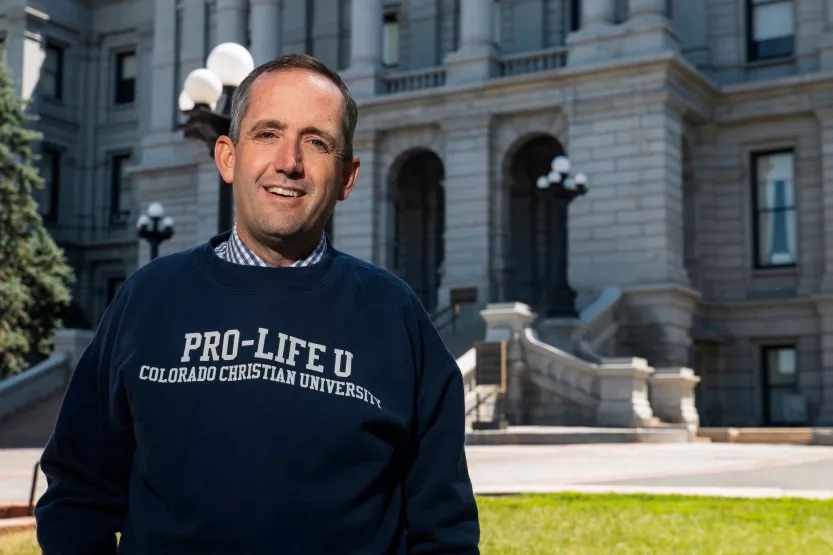In March, Jeffrey Hunt, a talk radio host and former employee of Colorado Christian University, attended a Colorado State Senate hearing focused on three bills aimed at regulating crisis pregnancy centers, but was removed from the gallery because he was wearing a sweatshirt that said “Pro-Life U.”
Hunt was subjected to removal due to a gallery rule that prohibited gallery attendees from wearing “pins or apparel expressing political statements.”
In a July demand letter, the Foundation for Individual Rights and Expression (FIRE), a free speech legal advocacy group, requested that Colorado House and Senate Sergeants-At-Arms refrain from enforcing the gallery rule, stating it “violates the First Amendment rights of Coloradans, including our client Jeffrey Hunt, who wish to engage in silent, nondisruptive political expression pins and apparel.”
On Aug. 14, Colorado House and Senate officials rescinded the gallery rule and removed it from signs posted around the gallery and on its website.
In an interview with First Amendment Watch, FIRE attorney Josh Bleisch explained the First Amendment concerns with Hunt’s removal from the Capitol gallery, described legislative galleries as limited public forums, and discussed how the vagueness of the rule can lead to viewpoint discriminatory enforcement.
Editor’s note: FIRE has donated to First Amendment Watch projects. This interview has been edited and condensed for length and clarity.
FAW: When does the banning of political speech cross the line into viewpoint discrimination?
JB: Really, that’s kind of the problem with content-based rules. And that’s what this rule is on its face, right? It prohibits certain speech because of its content, if it’s political, and that’s really what the problem with the rule is on its face. But what we saw in one of the problems with having a rule banning political apparel in such an undefined, kind of vague term is that it can be enforced in a viewpoint discriminatory manner. And as was mentioned in our press release and in our demand letter, it looks like there was a big, large group of high school students that were allowed in with political shirts that were calling for stronger gun control measures, and they were allowed in just fine, but Jeff’s pro-life speech was not, and that seems to be viewpoint discriminatory, at least in enforcement.
FAW: The Capitol gallery rule bars “pins or apparel expressing political statements.” Has this been enforced before? When was the rule instituted?
JB: We really don’t have any information about that, unfortunately. The information that we have is really just based on public reporting and that includes its enforcement against Jeff Hunt, and then the high school students who were wearing the pro-gun control T-shirts. There have been other issues, I know, again, according to public reporting in the Colorado State Capitol, with some pro-Gaza protesters filling the galleries, and eventually they were forced to leave, not necessarily because they were wearing political attire, although I think they were — they had flags, they had large banners — but were otherwise causing disruptions. That’s not really the problem that we were trying to challenge here. That’s not really what Jeff Hunt was trying to do at all. He was just trying to silently and respectfully express himself. And indeed anybody else who wants to wear any kind of political apparel, they should be allowed to do so. If you’re not causing any disturbances, if you’re not disrupting the proceedings below, but just wearing a Pro-Life U sweatshirt, or a rainbow flag pin, or whatever the political speech might be, that’s something the First Amendment protects.
FAW: What if a rule banned all messages of any kind, without specifying political content or any other specific content. Would an across-the-board prohibition on all signage and messaging also run afoul of the First Amendment?
JB: I think it depends. I think it might. First and foremost, the problem with the Capitol gallery rule as written is that it really wasn’t capable of reasoned application. And this comes from a 2018 Supreme Court case, Minnesota Voters Alliance v. Mansky, that banned political shirts in polling places in Minnesota. And the problem with a rule like that is that anybody who’s enforcing this, in this case Sergeants-At-Arms, they have to make a decision. Is a Tesla shirt political? Is Bud Light political? Is a rainbow flag pin political? Support our troops. #MeToo. Whatever it might be, those are kind of hard to make, and it’s not really capable of reasoned application. So to answer your question more directly, a rule that banned all messages might be capable of reasoned application. Somebody might be able to pretty easily discern, “OK, is there a message here? Is there writing? Yes or no? OK, we can apply this rule.” But you also have to look at whether a rule like that, if it’s content-based, in light of the purposes served by the forum, is it reasonable to ban any message of any kind in a public gallery? It’s reasonable to prevent disruption, it’s reasonable to prevent cheering or outbursts or something like that, but I don’t know that it would be reasonable to prohibit any message of any kind.
FAW: Is a legislative gallery a traditional public forum or a limited public forum? What reasonable time, place and manner restrictions might apply in such a place?
JB: We think that it would be considered a limited public forum. I think some courts that have considered it [have decided] that they’re a limited public forum. And so in that case, there can be restrictions, but they have to be viewpoint neutral, and they have to be reasonable in light of the purpose served by the forum. And really that’s the case too, even if a court had decided that this was a non-public forum, that’s what the Supreme Court decided in Mansky, a voting booth was a non-public forum. But it didn’t matter, even though it was a non-public forum, the rule there was not capable of reasoned application, which just means that the enforcers can’t really adequately enforce this or understand what it is actually meant to prohibit, and it’s not reasonable in the light of the purpose served by that forum.
FAW: Have you seen similar rules in other states? How has it been dealt with before? Have there been other cases and if so how were they decided?
JB: There are not any other specific cases that I know of. It’s something that we are looking into, whether there are other states with similar rules. I didn’t see anything with Colorado specifically, but there are others that might have similarities, or might be informal. So I don’t have a specific number, or specific states or anything else to compare it to and no other cases really as well. And I think that’s kind of what made what happened to Jeff Hunt so interesting from a lawyer’s perspective and from a free speech perspective. I think Mansky really provides the really strong precedent that what Jeff Hunt wanted to do was protected by the First Amendment, but there were no real cases specifically dealing with legislative galleries.
FAW: Did the hearing’s focus on the regulation of crisis pregnancy centers play a role in deciding that Hunt’s apparel was barred since he’s “pro-life”?
JB: That’s what the Senate spokeswoman said when asked about this by the media after Jeff Hunt was kicked out. She said that it was because, basically, when the legislature is considering a topic, they won’t allow political speech on that topic. But really, if that’s the case, that wasn’t written down anywhere, there’s no indication that that was how it was applied anywhere else. It’s not on the website, it’s not on the signs outside the gallery. To us, that’s really more of a rationalization after the fact of why they kicked out Jeff Hunt but allowed the students to remain. I just didn’t see that rule anywhere other than a single statement from the Senate spokeswoman.
FAW: In the letter to the House Chief Sergeant-At-Arms, Stephen Rosenthal, you note that it’s unclear what’s considered to be a political statement under the rule. Is this a vagueness issue? How would a rule like this, if ever, not run afoul of the First Amendment, such as a viewpoint neutrality case that you touched upon earlier?
JB: It’s a little bit similar, and it’s definitely a vagueness issue, and it’s similar kind of to what I was talking about with what the Supreme Court said in Mansky. It’s really, really similar, but it comes from a different legal background. And the problem with a vague rule is that one, it doesn’t give the ordinary people adequate knowledge or notice of what conduct might be prohibited. And two, the people who are enforcing it don’t have adequate guidelines to know what is actually prohibited, so that basically invites enforcers to enforce a policy like that in an arbitrary or discriminatory way. And so when you have a rule that bans political apparel, what does political mean? There’s no definition in the rule. There’s no clarification about what it might mean or what it might actually apply to, and that’s really vague. And so what it’s going to do is it’s going to chill the speech of people who want to steer as clear as possible, because they don’t want to run afoul of any kind of rule. But, that’s a problem. We don’t want rules like this chilling people’s protected First Amendment expression. It’s important that people are allowed to have that breathing room to express themselves, and the First Amendment makes sure that we do, in fact, have that breathing room.
FAW: While the language was scrubbed from the website and gallery signs, did you ever receive a response from Rosenthal addressing your letter?
JB: We did. We got a response from the head of the Office of Legislative Legal Services with the Colorado General Assembly responding to our demand letter, and they said in their response that the Speaker of the House and the Senate President of the Colorado State Legislature had rescinded the rule, and because the rule was no longer in effect, the Sergeants-At-Arms would no longer be enforcing it, and that they had removed it from the signs outside the gallery and took it down from the website. So yes, we got a response confirming that this rule was no longer and that’s exactly what we wanted.
FAW: Has Jeff discussed the probability or possibility of him going back to the Capitol gallery in a similar way in the future?
JB: Yeah, I don’t know if he has any specific plans, and it might depend on what the General Assembly has plans to consider next year when they start meeting again. But yeah, he absolutely wanted to go back and wear either that Pro-Life U shirt or other similarly expressive apparel. And it’s great that he and everybody else in Colorado now has the ability to do that.

